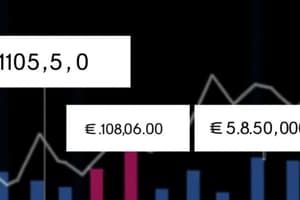Podcast
Questions and Answers
What does aggregate demand measure in macroeconomics?
What does aggregate demand measure in macroeconomics?
- Total quantity of goods and services supplied by firms in the economy
- Total quantity of money in circulation within the economy
- Total value of exports minus imports
- Total quantity of goods and services demanded by consumers, businesses, governments, and foreigners (correct)
What happens when aggregate demand decreases in an economy?
What happens when aggregate demand decreases in an economy?
- Economic growth will accelerate
- Unemployment rates will decrease
- Inflation may occur
- A recession may occur (correct)
What does national income accounting track in macroeconomics?
What does national income accounting track in macroeconomics?
- Flow of income earned by factors of production and service within an economy (correct)
- Flow of income earned by only the government in an economy
- Total value of imports and exports in an economy
- Flow of income earned by factors of production within an economy
Which factor is considered in macroeconomics to track economic growth?
Which factor is considered in macroeconomics to track economic growth?
How does an increase in aggregate demand affect prices in an economy?
How does an increase in aggregate demand affect prices in an economy?
What does aggregate supply show in macroeconomics?
What does aggregate supply show in macroeconomics?
What are the three principal components of economic growth?
What are the three principal components of economic growth?
What type of unemployment occurs due to lack of job opportunities?
What type of unemployment occurs due to lack of job opportunities?
What is inflation?
What is inflation?
What does the gender pay gap refer to?
What does the gender pay gap refer to?
What does public finance primarily concern itself with?
What does public finance primarily concern itself with?
What does trade policy encompass?
What does trade policy encompass?
Flashcards are hidden until you start studying
Study Notes
Economics
Economics is a wide-ranging discipline that studies how people interact with limited resources to meet unlimited wants and needs. It's split into two main branches—microeconomics and macroeconomics. Macroeconomics deals specifically with the economy as a whole—taking into account labor, money supply, national income, gross domestic product, price levels, unemployment rates, and more. Here's what you need to know about macroeconomics:
Aggregate Demand
Aggregate demand measures the total quantity of goods and services demanded by consumers, businesses, governments, and foreigners throughout the entire country during a given period of time. When aggregate demand decreases, a recession may occur; when it increases, inflation can ensue.
Aggregate Supply
Aggregate supply shows the amount of output firms are willing and able to produce at different price levels. It reflects both increasing returns to scale and diminishing marginal productivity. An increase in aggregate demand will lead to higher prices.
National Income Accounting
National income accounting tracks the flow of income earned by factors of production and factors of service within an economy over a specific period. Gross Domestic Product (GDP) is one key measure used to track economic growth.
Economic Growth
This refers to the rate of expansion of the economy over a specified period. The three principal components of economic growth are an increase in output per worker through increased efficiency, an increase in the number of workers, and an increase in the quality of human capital in terms of education, training, and health.
Unemployment
Unemployment occurs when individuals who want work cannot find jobs due to lack of job opportunities. There are different types of unemployment, including frictional, structural, and cyclical.
Inflation
Inflation is the process by which the general level of prices for goods and services is rising, and purchasing power is falling. It's commonly measured by the Consumer Price Index (CPI), which tracks changes in consumer prices.
Gender Pay Gap
The gender pay gap is the difference between men's and women's median wages. This discrepancy has been attributed to factors such as differences in skills, experience, and industry representation between male and female employees.
Public Finance
Public finance concerns itself with the financial position of governments and their role in redistributing wealth. It includes tax collection, borrowing, spending, and investment.
Trade Policy
Trade policy consists of the laws, treaties & agreements regulating international trade, and the initiatives and strategies of government aimed at promoting exports and controlling imports. Examples include tariffs, subsidies, and quotas.
International Monetary Fund (IMF)
The IMF is an intergovernmental organization responsible for monitoring global monetary and fiscal policies, providing financing to countries experiencing balance of payments problems, and setting standards for exchange rates and international transactions.
Understanding these concepts is crucial because they help us understand how economies behave, why we face challenges like unemployment or inflation, and what tools governments have at their disposal to respond to them.
Studying That Suits You
Use AI to generate personalized quizzes and flashcards to suit your learning preferences.




